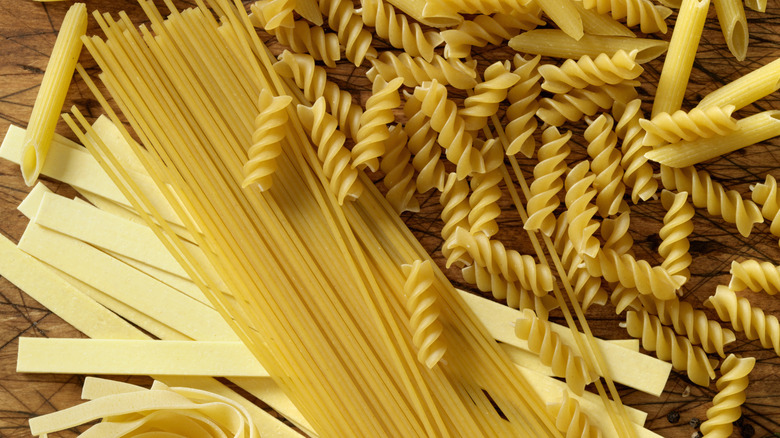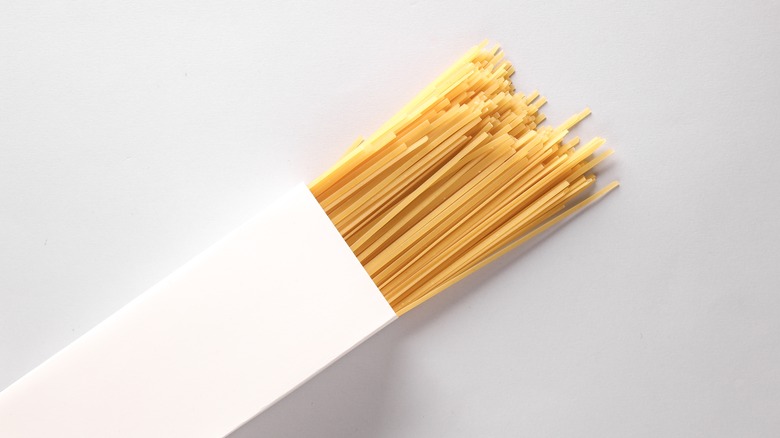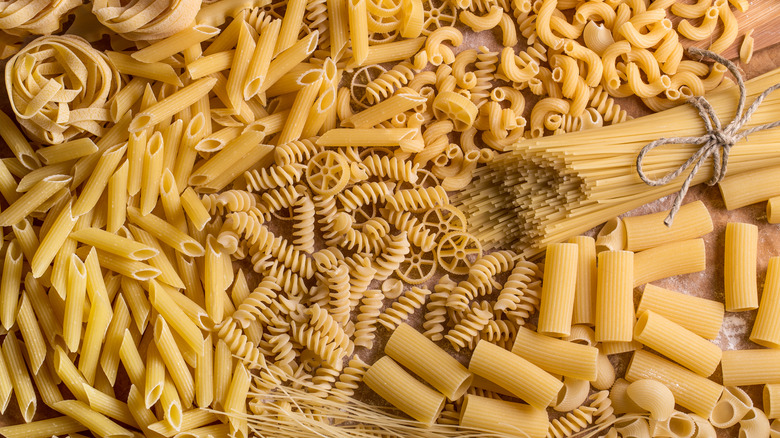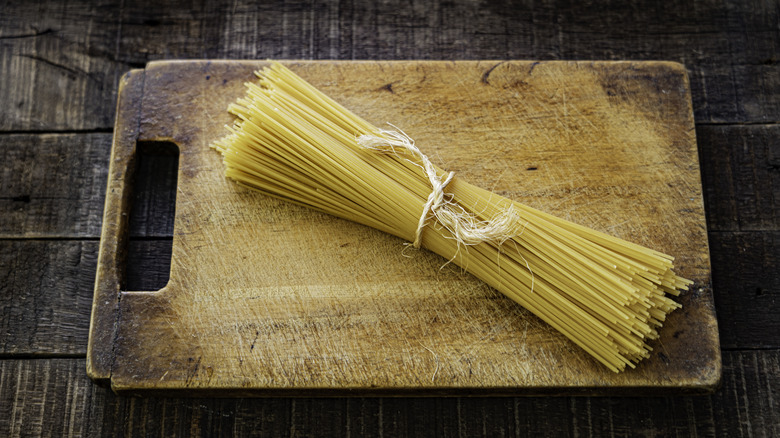Can Boxed Pasta Actually Go Bad In The Pantry?
Where would we be without pasta? Though modern pasta is Italian in origin (and before that, its roots as noodles trace to China), it's now a staple part of the American diet; the easiest thing to cook when you need a quick meal. And while you certainly can make pasta from scratch, it's a laborious process involving rolling out dough and cutting it into shapes; even with a stand mixer attachment, it can take a while. It's much easier just to eat boxed pasta — which, in addition to being easy to cook, is tremendously cost-effective.
And because it's so cost-effective, a lot of people might buy it in bulk and store it in their pantry indefinitely. But is that a problem? Can boxed pasta go bad if properly stored? Well, kind of. It can certainly get to a point where it's not ideal, but it doesn't go bad the way other foods do. It's unlikely to make you sick, but it might not taste great.
How long does boxed pasta last?
It's tempting to think of boxed pasta as a non-perishable food like canned goods that stay good basically forever if properly stored and undamaged. And they do last a long time — most expiration dates are listed at one to two years, and in reality, they should maintain their quality even longer than that since expiration dates are generally just the manufacturer's best guess at how long the pasta will stay in an ideal state. How long varies on a case-by-case basis; you should use your own judgment as a guide here.
There are a couple of ways to halt the natural decay process in food. The first is canning, which essentially hermetically seals the product against the introduction of oxygen and moisture, which are the critical drivers of decay and bacterial growth. The second, though, is dealing with moisture by having food that's naturally so dry it can't find purchase. This is why honey never goes bad; it might seem moist, but it actually has an extremely low water content since it's basically pure sugar. Bacteria can't find a way to grow on that — and dried pasta is, as its name suggests, similarly devoid of moisture.
Signs boxed pasta has gone bad
The easiest way for boxed pasta to go bad is for it to be stored improperly. If moisture and oxygen have been allowed to get into your pantry, it might've gotten wet; if you see any soggy parts of the pasta, it won't be ideal.
That's not the only way it might have issues, though. The more likely scenario, as long as the dried pasta has been appropriately stored, is that small changes in texture will manifest as dryness and brittleness. Use your eyes here: Pasta that's past its prime isn't likely to smell bad because of the lack of moisture — although this is more likely with egg pasta, and if it does smell bad, don't go anywhere near the stuff. But you can see if the pasta has started to crack, and that's the surest sign the result won't make for a great dinner.
What happens if you eat old pasta?
One thing that's important to point out: It's extremely unlikely that you will ever get sick from boxed pasta that's past its prime. It's theoretically possible for bacteria to grow on boxed pasta, but, as outlined above, it's doubtful as long as there's no flaw in the storage process. That last part is a key caveat: If moisture has gotten into the package, and the pasta smells, get rid of it immediately.
So, you're unlikely to get sick if you eat old pasta. It just might not taste as good as you'd hope and expect; dried pasta tends to lose its flavor and (maybe more importantly) its texture if it gets left in a pantry over a period of years. It won't kill you, but it won't taste good either.
How to properly store boxed pasta
Fortunately, correctly storing boxed pasta isn't difficult at all. Keep it in a cool, dry place, and you're good to go. Since that describes every properly kept pantry, finding your pasta a long-term home shouldn't be too difficult.
You can also theoretically store dried pasta in the freezer if, for whatever reason, you don't think you'll be able to eat it within a few years (or you have more freezer than pantry space). In this case, though, you'll want to make sure it's in an airtight container; moisture from your freezer itself can cause it to go bad faster if stored this way than if you just left it in the pantry. You can do the same with the fridge, but why would you? You're not making it last longer by refrigerating rather than freezing it, and the risk of moisture getting in is just as high.
However you store it, though, be aware the stuff lasts for a long time. Just use your eyes to tell if it's still good — and if it doesn't smell, the worst that can happen anyway is a lackluster meal.




